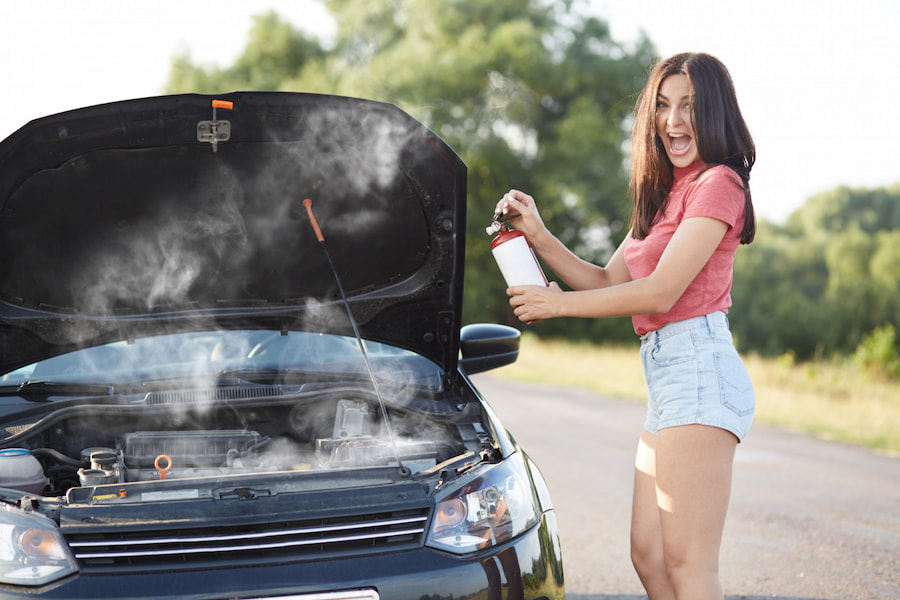Maintaining an optimal engine temperature remains a critical aspect of your vehicle’s well-being, particularly when faced with scorching summer conditions. The repercussions of engine overheating, from severe damage to wallet-draining repairs, emphasise the importance of proactive intervention. This guide will delve into actionable tips and preemptive maintenance tactics, ensuring your engine stays cool and guaranteeing a trouble-free summer driving experience. During high temperatures, engines face heightened strain, making preventive measures imperative. Beyond safeguarding against overheating, preserving engine health prolongs your vehicle’s life and sustains its performance.
Delving deeper into the causes of overheating and exploring effective strategies for prevention becomes paramount. Fuel injectors, essential components in modern engines, contribute to efficient combustion and engine performance. However, they can also be affected by heat, emphasising the need for comprehensive maintenance to ensure their optimal functioning. By integrating fuel injector care into your preventive measures, you fortify your engine’s ability to withstand temperature fluctuations and maintain peak performance even in the hottest seasons.
Check Coolant Levels:
Monitoring coolant levels stands as a critical factor in controlling engine heat. Regular checks are vital to maintaining the right coolant-to-water balance, ensuring optimal temperature regulation within your vehicle’s engine. Refer to your car’s manual for the prescribed coolant blend and maintain the reservoir at the suggested capacity.
Moreover, examine the coolant for any impurities or decline, as aged coolant loses its ability to disperse heat efficiently. This proactive approach safeguards against potential overheating issues, preserving your engine’s health and performance, especially during demanding conditions like high temperatures or prolonged drives.
Inspect Radiators:
Regular examination of the radiator and hoses is paramount for the cooling system’s effectiveness. Routinely check these components for potential leaks, cracks, or impairments that could hinder the smooth circulation of coolant. Swiftly replacing any damaged hoses is crucial to maintain uninterrupted coolant flow.
Keep the radiator fins debris-free to facilitate optimal heat dissipation. Employ a gentle approach when clearing dirt or debris from the fins, utilising a soft brush or compressed air to avoid causing harm. Ensuring these components remain in top condition enhances the cooling system’s efficiency, preventing potential overheating and sustaining your engine’s performance.
Inspect Belts And Hoses:
Consistent monitoring of the belts and hoses linked to the cooling system is crucial. Ensure a routine check to identify any signs of wear or damage in these components. Swift replacement of any worn-out or impaired belts and hoses is essential to prevent potential leaks and subsequent overheating issues. Timely action not only safeguards against coolant loss but also maintains the system’s integrity, ensuring optimal performance. By proactively attending to these vital parts, you fortify the cooling system’s reliability, minimising the risk of overheating-related complications and bolstering your engine’s longevity.
Temperature Gauge Monitoring:
Vigilantly monitor your vehicle’s temperature gauge during drives. Should you observe the gauge approaching the red zone, take immediate action by pulling over and shutting off the engine. This swift response is critical in averting potential engine damage caused by overheating. By proactively heeding the temperature gauge’s warnings, you safeguard the engine from severe harm and mitigate the risk of extensive repairs. Regularly checking this gauge during journeys ensures you catch any anomalies promptly, allowing for swift intervention to maintain your engine’s health and performance.
Check The Radiator Cap:
Monitoring the radiator cap’s condition is vital for regulating the cooling system’s pressure. Ensure the cap forms a tight seal to prevent any potential coolant leaks and uphold the necessary pressure levels within the system. Regular inspection and maintenance of the cap are essential. If you notice any signs of damage or wear, promptly replacing the cap is advisable to maintain the system’s integrity. This proactive approach safeguards against pressure irregularities, preserving the cooling system’s efficiency and preventing potential overheating issues that could compromise your engine’s health.
Use Engine Oil With Proper Viscosity:
Utilising the correct engine oil viscosity is pivotal for both engine temperature control and lubrication. Ensure adherence to the manufacturer’s specifications by using the recommended engine oil suitable for your car engine. Seeking guidance from your vehicle’s manual or a certified mechanic is advisable to ascertain the precise oil viscosity required for optimal engine performance.
Employing the right oil maintains proper lubrication, enabling smoother engine operation while effectively managing temperature fluctuations. This meticulous approach in selecting the appropriate oil guarantees enhanced engine efficiency, reducing the risk of overheating and contributing to your vehicle’s prolonged health.
Safeguarding your car engine from overheating demands a proactive approach encompassing regular maintenance, understanding the causes, and adopting appropriate preventive measures. By staying vigilant, adhering to recommended maintenance schedules, and employing driving practices conducive to engine health, you can significantly reduce the risk of engine overheating. Remember, a well-maintained cooling system is the cornerstone of a healthy engine and ensures a smoother, safer driving experience while extending the lifespan of your vehicle.
Also, read: Keep Your Car Security With These Advanced Safety Tips
